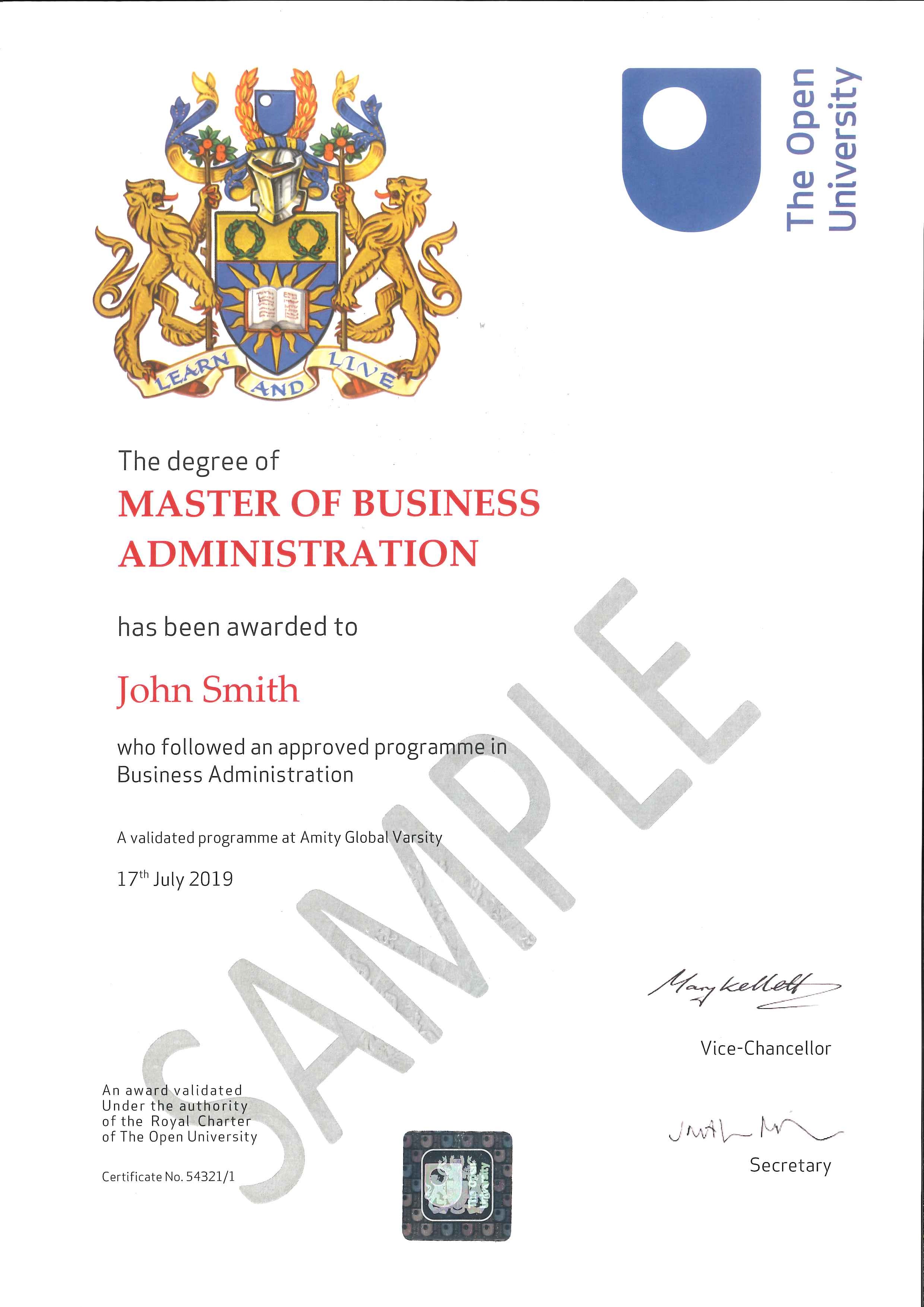
This Masters of Business Administration Program has an internationally recognized, practice-based and integrated approach to management development. It directs the learners towards improving their management capabilities and develop interpersonal, strategic and decision making skills to emerge effective thought leaders.

Duration: 2 years (Part-time)
Method of Study : Distance Learning
Mode of Delivery : Online
Credits : 180
Amity's Masters of Business Administration is a unique qualification designed for practicing senior and middle-level managers. It is designed to develop strategic analysis, interdisciplinary skills, creativity and innovation in professionals. With international emphasis and global reputation, our program is highly beneficial for all executives looking to further their career by climbing the corporate ladder to success. Explore the Amity Masters of Business Administration Program: offered in a format tailored to the varying needs of today’s working professionals.
 Degree validated and awarded by The Open University, UK
Degree validated and awarded by The Open University, UK
This MBA programme contains licensed content from the Open University's triple accredited business school. Open University Business School is one of an elite group to have earned AACSB, AMBA and EQUIS accreditation - Awarded by the world's leading international management education associations to fewer than 1% of business schools globally.
Educational Aim
Amity's Masters of Business Administration is a career development generalist Program for students with significant relevant work experience on which the learning process should build. The main emphasis of the Program is on leadership through strategic management. While the academic level is Masters, there is a strong practical and professional orientation to the curriculum.
As an MBA graduate, you should be able to ground your new knowledge within the base of your professional experience. You will be able to integrate new knowledge with that experience and apply it to new situations, and challenge preconceptions and remove subject and functional boundaries so as to handle complex situations holistically. Besides, you inculcate useful strengths to analyze, synthesize and solve complex and unstructured business problems. In addition to being able to communicate your findings, you develop the skills to implement agreed solutions effectively and efficiently. The Program is also designed to strongly develop interpersonal skills for interacting effectively with a range of specialists.
The qualification provides opportunities for you to develop and demonstrate knowledge, understanding, qualities, skills and other attributes in a range of different areas.
Knowledge and Understanding
You will be able to collect relevant information across a range of areas pertaining to a current situation. Within the broad framework of organizations, their external context and management, you will be able to use knowledge to analyze (by classifying, contrasting, discriminating, examining), to synthesize (by constructing, creating, formulating, hypothesizing, negotiating, planning, validating) and to evaluate (by appraising, concluding, judging, measuring, prioritizing, recommending) cases in the following areas:
Cognitive Skills
After completion of the Masters of Business Administration Program, you will effectively be able to:
Practical and/or Professional Skills
You will be able to imbibe the following interpersonal and professional skills after successfully completing your module of study:
Key Organizational Skills
A few organizational skills that you master after completion of the Program are as follows:
You learn through two inter-related methods. First, using a range of specially-written study materials, case studies, original texts, study guides and assignments and through a range of multi-media material and activities. Secondly, your learning is supported through an allocated tutor. This tutor is your first and main point of contact. The tutor answers queries on the materials, grades and comments on your work and arranges and runs tutorials.
Samples of tutors’ marking and comments are monitored by members of the central module team or experienced tutors who provide feedback to generate comments intended to support and develop tutors’ assessment and grading of assignments.
In some cases the assignments may be formative (for example at the beginning of a module to enable you to develop your confidence), but usually they are summative, i.e. they count towards your module result. Modules may also include computer-marked assignments or examination papers.
Formative assessment in the form of informal self-assessed questions allow you progressively to assess your own progress and understanding. Formal assessment of knowledge and understanding components of the Program is achieved by a series of tutor-marked assignments (TMAs). These assignments are marked and assessed by the module tutor. They are central to the teaching of the module since they allow you an opportunity to display your knowledge and understanding – and in consequence any issues concerning either – and so enable tutors to identify and comment on your knowledge and understanding. Tutors receive detailed marking guidance from the module team.
You are also encouraged to participate in forums at both national and local levels. This gives you a chance to share and resolve issues with fellow students as well as tutors and the module team.
Most modules also include a three-hour written examination but may involve an end-of-module assessment which could include an investigation-based report.
Making a difference: your management initiative is the final module of masters-level management learning and it’s designed to build upon all the studying that you’ve done in other modules.
This is the module where you take out one or more of the management theories that have intrigued you or made you think ‘if only we did that at our place...’ and try it out in the day-to-day reality of trying to make things happen in organisations.
This module is a chance for you to demonstrate the skills and knowledge that you have acquired as you progressed through the MBA. As such it should be viewed as a ‘showcase’ for your ability as a critical practitioner, able to fully engage with theory and its application in a real world context.
The ‘master’ in the degree title signifies your ‘mastery’ of the art and science of management. The emphasis for learning is directly rooted in management practice.
To achieve this level of capability the MBA programme concentrates on strategic analysis, interdisciplinary skills, intellectual stimulation and independent judgement and covers core themes such as: critical engagement; embedding theory in practice and global impact awareness.
Core disciplines that you'll study include human resource management, organisational behaviour, accounting and finance, marketing and operations.
In total, 75 per cent of the programme consists of compulsory elements with 25 per cent comprising elective modules. This enables you to select the curriculum to suit your needs. MBA modules are challenging, but will always direct you towards improving your management capabilities.
The MBA program follows Subject Benchmark Statement Quality Assurance Agency – UK
Master's graduates will have a broad knowledge and understanding of organisations, the external context in which they operate and how they are managed. They will understand and be able to respond to change. They will have intellectual breadth and be able to make integrative links across the various areas of organisations. They will have strongly developed interpersonal and team working skills. They will have an additional range of skills beyond those general skills expected of first degree holders.
Applicant must possess sufficient knowledge and understanding of ENGLISH Language. Candidates whose first Language is not English must have completed at least three (3) years of Academic Qualifications under English Medium.
| Year | Domestic (INR) | USD |
|---|---|---|
1 |
INR 400,000 |
6000 |
2 |
INR 200,000 |
3000 |
| Total | INR 600,000 | 9000 |
*USD Exchange Rates are indicative only and are subject to change.
*Late Fees Clause : A late fee of INR 3000 will be applicable in case the payment is not done within one month of the respective semester fee payment due date which is generally a month prior to the start of the semester. Exact dates are prescribed at the time of admission. Beyond one month the fee for that semester will not be accepted, and you will have to defer your programme for 6 months.
*Unlike many schools, the AGV fee includes the cost of study materials, LMS access, bridge courses if recommended, interactive live sessions as well as examination fees. No separate fee is charged even for Resit and Retake examination. The students can also schedule individual sessions with the faculty, no separate fee is charged for academic delivery and counselling. The institute at times also organizes Campus visits either for induction, or sessions or conferences, no separate fee is charged for attending those events. The fee, however, does not include any transit expenses, food and lodging for these events. Programme fee is updated with every new intake, which is decided by the programme team and is disclosed before the start of admissions for that session. The programme fee stands same for what is disclosed at the time of admission and remains same for that batch even if the fee is revised for subsequent sessions. However, deferral fee may be applicable if the institute is charged the same from the partner University, which is OU in this case. In that case, the fee changed from the student will be same as fee charged from the partner University.
For refund policy Click http://www.amityglobalvarsity.com/PDF/appeal_policy_for_admissions.pdf

27+ years’ experience, author of 5 Books and 100+ research papers, winner of 4 Corporate Awards, 8 Research Fundings PhD, Queensland University of Technology (QUT), Australia
Associations: University of Manchester, UK; Copenhagen Business School, Denmark; SDA Bocconi, Italy; Athens University of Economics and Business, Greece
Specialization: General Management, Marketing

20+ years experience in teaching, consulting and research, author of 1 Book and 30+ research artcles.
Associations: American University in the Emirates, Dubai; University of California and Woodbury University, California, USA; University of Phoenix, Arizona, USA
Specialization: General Management, Leadership, Marketing, HR and OB, Business Communication

8+ years’ experience, winner of 5 Awards, PhD, Capella University, Minneapolis
Associations: Michigan University, ATcicJ Ministries, Co-founder, NAFTA, U.S. Customs Compliance
Specialization: General Management, HR and OB

Dean and Programe Director, AGV
Associations: Professor and Quality Control Specialist at European Business School, Barcelona; European Business University of Luxemburg; ISM, Germany Pedagogy Specialist Certification by Ukeiri Funded, UK
Specialization: Finance and Accounting, General Management, Research Methodology

Professor, Princeton Noorah University
Co-Founder - DigiGYAN
17+ Years of experience in teaching, research, training and industry
Specialization: Marketing & Digital Marketing

External Examiner, AGV
12+ years experience in teaching, research and consulting. PhD, Retail Marketing, The Manchester Metropolitan University
Associations: Manchester Business School, University of Tasmania,

External Examiner, AGV
18+ years' experience teaching, research and consulting PhD Educational Research, Lancaster University
Associate Professor, Kingston University, UK

External Examiner, AGV
Senior Lecturer, Manchester Metropolitan University
Associations: Co-operative Financial Services Group, United Utilities Plc, Barclays Bank